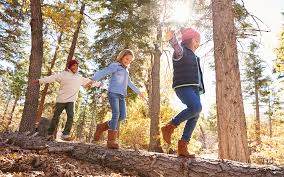Child
SAFETY

OUR COMMITMENT TO
child safety & protection

Camp Fire North Shore is devoted to the well-being of children and youth through safe, positive programming experiences.
Safety is our number one priority.

Statement on Zero
Tolerance for Abuse
Camp Fire North Shore implements nationwide youth protection standards based on industry best practices, we have the primary responsibility for risk management and youth protection in our organization. This includes the establishment of policies and procedures that best protect youth, effective screening and selection of staff, and professional monitoring and supervision.
Camp Fire North Shore is a zero-tolerance for abusive behaviors; we do not tolerate any adult who sexual abuses or willfully harms a child (or attempts to do either).
How and where to report concerns

We train our professional staff to recognize, respond, and immediately report any suspicions or allegations of child abuse or exploitation to child protection or law enforcement professionals. Camp Fire North Shore reports any allegation or suspicion of child abuse or exploitation involving an adult associated with Camp Fire to DCF as required by state law.
Parents, guardians, staff, youth participants, and other community members are encouraged to report any unsafe behaviors, policy violations, or safety concerns to us at Camp Fire North Shore, one way to do that is to call us at the phone number below. Concerns and complaints can also be made to our office by e-mail to mcole@campfirenorthshore.org or by using our contact form here. If you need to report an emergency situation involving child sexual abuse, please call 911.

Safeguards In Place
At Camp Fire North Shore, safety is our number one priority. We understand that child abuse, child sexual exploitation, and child sexual misconduct are pervasive problems that must be managed in a pro-active manner if we are to protect those in our care.
The following are a few examples of the safeguards we have in place:

Background Checks:
Camp Fire North Shore conducts background screening of all staff aas an obligation contained in the Camp Fire Charter Agreement.

Mandatory reporting:
Camp Fire North Shore staffers immediately report any allegations and/or criminal charges of abuse, child sexual exploitation, or child sexual misconduct to the appropriate authorities (DCF) as required by law.

National Youth Protection Standards:
We adhere to national policies, procedures, and practices that are enforced by our Board of Directors and CEO. We remain in good standing with the national Camp Fire network.

Resources for Staff:
Camp Fire North Shore provides standardized, impactful training and resources for Camp Fire staff on recognizing and responding to suspected or disclosed child abuse as well as offender behaviors and peer-to-peer sexual activity.

Resources for parents, guardians, and other community members
The following videos are designed to provide parent, guardians, and other community members with general information they need to support abuse prevention. We also encourage you to check out https://www.preventabuse.com/#parents for age-appropriate materials to start the conversation about sexual abuse and self protection with the children in your life.
FOR MINORS
National Child Abuse Hotline:
1-800-4-A-Child (1-800-422-4453) | childhelp.org
CyberTipline:
1-800-THE-LOST (843-5678) | CyberTipline.org
Child Welfare Information Gateway:
1-800-394-3366 | childwelfare.gov
FOR PARENTS
SEXUAL ASSAULT AND HUMAN TRAFFICKING
National Sexual Assault Hotline:
1-800-656-HOPE (4673) | www.rainn.org
National Human Trafficking Hotline:
1-888-373-7888 | Text 233733 | humantraffickinghotline.org
National Center on Sexual Exploitation:
1-202-393-7245 | endsexualexploitation.org
National Child Advocacy Centers
CHILDREN’S ADVOCACY CENTERS (CACs):
Local, community-based services that support children and families affected by sexual abuse by working with other professionals, like law enforcement officials, child protective services investigators, healthcare workers, mental health professionals, and lawyers. CAC’s are most likely mandated reporters and may be required to report suspected child abuse to law enforcement.
Website: nationalcac.org/find-a-cac
NATIONAL CENTER FOR MISSING & EXPLOITED CHILDREN (NCMEC):
Non-profit organization with the mission of finding missing children, and preventing child sexual exploitation and victimization. They take reports of child pornography, or sexual images and videos of children, and provide resources and information through their CyberTipline. There is also information on their website about what someone can do if there are sexual pictures or videos of their children online.
CyberTipLine: 800.THE.LOST (843.5678) | missingkids.org
NATIONAL SEXUAL ASSAULT HOTLINE and live chat:
This hotline is run by RAINN, the nation’s largest anti-sexual violence organization. It’s available 24/7/365 for those affected by sexual abuse and their loved ones to receive free, anonymous and confidential support. Hotline: 800.656.HOPE (4673) | online.rainn.org
Darkness to Light
Praesidium
CDC RESOURCES
CHILDHELP NATIONAL CHILD ABUSE HOTLINE:
Confidential hotline with professional crisis counselors that give out crisis intervention, information, and referrals 24/7/265 and in over 170 languages, focused on preventing child abuse in the U.S. and Canada. Hotline: 800.4.A.CHILD (22.4453) | childhelp.org

Video resources
The following videos are designed to provide parent, guardians, and caregivers general information you need to support abuse prevention. We provide this information because we know that prevention requires a multi-layered approach and that every adult involved has a responsibility in protecting youth participants in Camp Fire programs. It’s our hope you will partner with us in this attempt. We also encourage you to check out https://www.preventabuse.com/#parents for age-appropriate materials to start the conversation about sexual abuse and self-protection with the children in your life.
Introduction:
How to Respond:
Talking to Your Child:
Abuse and Warning Signs:
If you need assistance accessing video content, please reach out to us.




